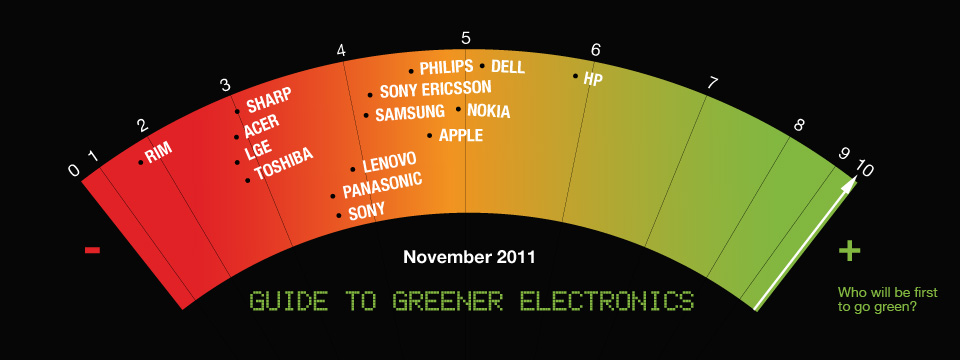HP headlines latest Greenpeace 'greener electronics' list

Since when was 5.9 out of 10 a particularly good score? The answer, in my mind, is that it really isn't, but it was enough to put Hewlett-Packard in the No. 1 spot on environmental advocacy organization Greenpeace's latest "Guide to Greener Electronics."
That was a big leap for HP, which moved up three places on the ranking, mainly due to its scores on the sustainability of its overall operations and its energy efficiency efforts. Dell and Apple also leapt up the list significantly. Dell was No. 2 with a score of 5.1 (up eight places) and Apple leapt five places to No. 4 with a score of 4.6.
The Greenpeace guide, now in its 17 edition, looks at criteria in three different areas: energy, greener products and sustainable operations. "After many of the world's leading electronics companies rose to the challenge of phasing out the worst hazardous substances, we are now challenging them to improve their sourcing of minerals and better managing the energy use throughout the supply chain," said Greenpeace International campaigner Tom Dowdall.
Here is the complete list of criteria:
- Disclose own operational greenhouse gas (GHG) emissions
- GHG emissions reductions and targets
- Clean electricity plan
- Clean energy policy advocacy
- Product energy efficiency
- Avoidance of hazardous substances in products
- Use of recycled plastics in products
- Product lifecycle
- Measure and reduce energy consumption in the supply chain
- Chemicals management and advocacy
- Policy and practice on sustainable sourcing of fibers for paper
- Policy and practice on avoidance of conflict minerals
- Provides effective voluntary take-back where no EPR laws
- HP (5.9): The company received its highest scores for GHG emissions disclosure and paper sourcing policies. Some of its lowest marks were for product lifecycle and take-back issues, and clean energy advocacy.
- Dell (5.1): Like HP, the company received props for disclosure and paper sourcing, but it got zero scores for clean energy advocacy and product lifecycle concerns.
- Nokia (4.9): The mobile technology giant slipped two positions on the list, losing out to HP and Dell in energy criteria. The company scored well for GHG emissions disclosure, energy efficiency, and voluntary take-back.
- Apple (4.6): Apple got close to the maximum points possible for electronics waste policy and also scored well on energy efficiency. It got zero scores, though, for clean energy policy, use of recycled plastic, and paper sourcing policies. Apple shares the top spot for green product criteria.
- Philips (4.5): Down two positions, Philips was recognized for its clean energy advocacy.
- Sony Ericsson (4.2): The company slipped four spots, primarily for its weakness on energy criteria.
- Samsung (4.1): Its best scores cam for GHG emissions disclosure, but it risks penalties on future lists for its decision to join a trade association that has commented AGAINST strict energy efficiency standards.
- Lenovo (3.8): Another big climber on the list, up six positions. That was partly because it had been penalized on materials policy in the last round. Since that time, it has improved in that regard but like Samsung, Lenovo is member of a trade association that has come out against stringent energy efficiency.
- Panasonic (3.6): The company does well on green products, but it slipped three places for its stances on energy criteria.
- Sony (3.6): Technically speaking, Sony is tied for No. 9 on the list. But it rates a big "tsk, tsk" for a penalty point it earned for its comments against energy efficiency standards in California. Ironically, Sony scores well in actual product energy. Go figure.
- Sharp (3): The company maintained its position, but did very poorly when it came to operational sustainability, especially paper sourcing policy, conflict minerals avoidance and chemicals management and advocacy.
- Acer (2.9): According to Greenpeace, the company hasn't really taken a leadership position on any of the three areas it considers. It does best on chemicals management and advocacy.
- LG Electronics (2.8): The company benefitted from the removable of a penalty point on last year's list related to backtracking on a materials elimination commitment. Its lowest scores comes from energy goals.
- Toshiba (2.8): Actually tied for LG in position No. 13 on the list, Toshiba has made progress on its green products commitments. Like several other companies on the list, it is being watched for its membership in a trade association that has a lax position on energy efficiency.
- RIM (1.6): This is the first time that the mobile technology company has appeared on the list. It sets an example for energy efficiency but has few formal polices in place for many of the criteria that Greenpeace follows, which worked against it for this ranking.
